- Home
- Brand, Max
the Untamed (1919)
the Untamed (1919) Read online
The Untamed
Max Brand
*
Chapter I
Pan Of The Desert.
EVEN to a high-flying bird this was a country to be passed over quickly. It was burned and brown, littered with fragments of rock, whether vast or small, as if the refuse were tossed here after the making of the world. A passing shower drenched the bald knobs of a range of granite hills and the slant morning sun set the wet rocks aflame with light. In a short time the hills lost their halo and resumed their brown. The moisture evaporated. The sun rose higher and looked sternly across the desert as if he searched for any remaining life which still struggled for existence under his burning curse.
And he found life. Hardy cattle moved single or in small groups and browsed on the withered bunch grass. Summer scorched them, winter humped their backs with cold and arched up their bellies with famine, but they were a breed schooled through generations for this fight against nature. In this junk-shop of the world, rattlesnakes were rulers of the soil. Overhead the buzzards, ominous black specks pendant against the white-hot sky, ruled the air.
It seemed impossible that human beings could live in this rock-wilderness. If so, they must be to other men what the lean, hardy cattle of the hills are to the corn-fed stabled beeves of the States.
Over the shoulder of a hill came a whistling which might have been attributed to the wind, had not this day been deathly calm. It was fit music for such a scene, for it seemed neither of heaven nor earth, but the soul of the great god Pan come back to earth to charm those nameless rocks with his wild, sweet piping. It changed to harmonious phrases loosely connected. Such might be the exultant improvisations of a master violinist.
A great wolf, or a dog as tall and rough coated as a wolf, trotted around the hillside. He paused with one foot lifted and lolling, crimson tongue, as he scanned the distance and then turned to look back in the direction from which he had come. The weird music changed to whistled notes as liquid as a flute. The sound drew closer. A horseman rode out on the shoulder and checked his mount. One could not choose him at first glance as a type of those who fight nature in a region where the thermometer moves through a scale f a hundred and sixty degrees in the year to an accompaniment of cold-stabbing winds and sweltering suns. A thin, handsome face with large brown eyes and black hair, a body tall but rather slenderly made--he might have been a descendant of some ancient family of Norman nobility; but could such proud gentry be found riding the desert in a tall-crowned sombrero with chaps on his legs and a red bandana handkerchief knotted around his throat? That first glance made the rider seem strangely out of place in such surroundings. One might even smile at the contrast, but at the second glance the smile would fade, and at the third, it would be replaced with a stare of interest. It was impossible to tell why one respected this man, but after a time there grew a suspicion of unknown strength in this lone rider, strength like that of a machine which is stopped but only needs a spark of fire to plunge it into irresistible action. Strangely enough, the youthful figure seemed in tune with that region of mighty distances, with that white, cruel sun, with that bird of prey hovering high, high in the air.
It required some study to guess at these qualities of the rider, for they were such things as a child feels more readily than a grown man; but it needed no expert to admire the horse he bestrode. It was a statue in black marble, a steed fit for the Shah of Persia! The stallion stood barely fifteen hands, but to see him was to forget his size. His flanks shimmered like satin in the sun. What promise of power in the smooth, broad hips! Only an Arab poet could run his hand over that shoulder and then speak properly of the matchless curve. Only an Arab could appreciate legs like thin and carefully drawn steel below the knees; or that flow of tail and windy mane; that generous breast with promise of the mighty heart within; that arched neck; that proud head with the pricking ears, wide forehead, and muzzle, as the Sheik said, which might drink from a pint-pot.
A rustling like dried leaves came from among the rocks and the hair rose bristling around the neck of the wolflike dog. With outstretched head he approached the rocks, sniffing, then stopped and turned shining eyes upon his master, who nodded and swung from the saddle. It was a little uncanny, this silent interchange of glances between the beast and the man. The cause of the dog's anxiety was a long rattler which now slid out from beneath a boulder, and giving its harsh warning, coiled, ready to strike. The dog backed away, but instead of growling, he looked to the man.
Cowboys frequently practise with their revolvers at snakes, but one of the peculiarities of this rider was that he carried no gun, neither six-shooter nor rifle. He drew out a short knife which might be used to skin a beef or carve meat, though certainly no human being had ever used such a weapon against a five-foot rattler. He stooped and rested both hands on his thighs. His feet were not two paces from the poised head of the snake. As if marvelling at this temerity, the big rattle tucked back his head and sounded the alarm again. In response the cowboy flashed his knife in the sun. Instantly the snake struck but the deadly fangs fell a few inches short of the riding boots. At the same second the man moved. No eye could follow the leap of his hand as it darted down and fastened around the snake just behind the head. The long brown body writhed about his wrist, with rattles clashing. He severed the head deftly and tossed the twisting mass back on the rocks.
Then, as if he had performed the most ordinary act, he rubbed his gloves in the sand, cleansed his knife in a similar manner, and stepped back to his horse. Contrary to the rules of horse-nature, the stallion had not flinched at sight of the snake, but actually advanced a high-headed pace or two with his short ears laid flat on his neck, and a sudden red fury in his eyes. He seemed to watch for an opportunity to help his master. As the man approached after killing the snake the stallion let his ears go forward again and touched his nose against his master's shoulder. When the latter swung into the saddle, the wolf-dog came to his side, reared, and resting his forefeet on the stirrup stared up into the rider's face. The man nodded to him, whereat, as if he understood a spoken word, the dog dropped back and trotted ahead. The rider touched the reins and galloped down the easy slope. The little episode had given the effect of a three-cornered conversation. Yet the man had been as silent as the animals.
In a moment he was lost amongst the hills, but still his whistling came back, fainter and fainter, until it was merely a thrilling whisper that dwelt in the air but came from no certain direction.
His course lay towards a road which looped whitely across the hills. The road twisted over a low ridge where a house stood among a grove of cottonwoods dense enough and tall enough to break the main force of any wind. On the same road, a thousand yards closer to the rider of the black stallion, was Morgan's place.
Chapter II
The Panther IN THE ranch house old Joseph Cumberland frowned on the floor as he heard his daughter say: "It isn't right, Dad. I never noticed it before I went away to school, but since I've come back I begin to feel that it's shameful to treat Dan in this way."
Her eyes brightened and she shook her golden head for emphasis. Her father watched her with a faintly quizzical smile and made no reply. The dignity of ownership of many thousand cattle kept the old rancher's shoulders square, and there was an antique gentility about his thin face with its white goatee. He was more like a quaint figure of the seventeenth century than a successful cattleman of the twentieth.
"It is shameful, Dad," she went on, encouraged by his silence, "or you could tell me some reason."
"Some reason for not letting him have a gun?" asked the rancher, still with the quizzical smile.
"Yes, yes!" she said eagerly, "and some reason for treating him in a thousand ways as if he were an irresponsible boy."
He drew her onto a stool beside him, holding both her hands, and searched her face with eyes as blue and almost as bright as her own. "How does it come that you're so interested in Dan?"
"Why, Dad, dear," and she avoided his gaze. "I've always been interested in him. Haven't we grown up together?"
"Part ways you have."
"And haven't we been always just like brother and sister?"
"You're talkin' a little more'n sisterly, Kate."
"What do you mean?"
"Ay, ay! What do I mean! And now you're all red. Kate, I got an idea it's nigh onto time to let Dan start on his way."
He could not have found a surer way to drive the crimson from her face and turn it white to the lips.
"Dad!"
"Well, Kate?"
"You wouldn't send Dan away!"
Before he could answer she dropped her head against his shoulder and broke into great sobs. He stroked her head with his calloused, sunburned hand and his eyes filmed with a distant glaze.
"I might have knowed it!" he said over and over again; "I might have knowed it! Hush, my silly gal."
Her sobbing ceased with magic suddenness.
"Then you won't send him away?"
"Listen to me while I talk to you straight," said Joe Cumberland, "and accordin' to the way you take it will depend whether Dan goes or stays. Will you listen?"
"Dear Dad, with all my heart!"
"Humph!" he grunted, "that's just what I don't want. This what I'm goin' to tell you is a queer thing--a mighty lot like a fairy tale, maybe. I've kept it back from you years an' years thinkin' you'd find out the truth about Dan for yourself. But bein' so close to himj has made you sort of blind, maybe! No man will criticize his own hoss."
"Go on, tell me what you mean. I won't interrupt."
He was silent for a moment, frowning to gather his thoughts.
"Have you ever seen a mule, Kate?"
"Maybe you've noticed that a mule is just as strong as a horse----"
"Yes."
"--but their muscles ain't a third as big?"
"Yes, but what on earth----"
"Well, Kate, Dan is built light an' yet he's stronger than the biggest men around here."
"Are you going to send him away simply because he's strong?"
"It doesn't show nothin'," said the old man gently, "savin' that he's different from the regular run of men--an' I've seen a considerable pile of men, honey. There's other funny things about Dan maybe you ain't noticed. Take the way he has with hosses an' other animals. The wildest man-killin', spur-hatin' bronchos don't put up no fight when them long legs of Dan settle round 'em."
"Because they know fighting won't help them!"
"Maybe so, maybe so," he said quietly, "but it's kind of queer, Kate, that after most a hundred men on the best hosses in these parts had ridden in relays after Satan an' couldn't lay a rope on him, Dan could jest go out on foot with a halter an' come back in ten days leadin' the wildest devil of a mustang that ever hated men."
"It was a glorious thing to do!" she said.
Old Cumberland sighed and the shook his head.
"It shows more'n that, honey. There ain't any man but Dan that can sit the saddle on Satan. If Dan should die, Satan wouldn't be no more use to other men than a piece of haltered lightnin'. An' then tell me how Dan got hold of that wolf, Black Bart, as he calls him."
"It isn't a wolf, Dad," said Kate, "it's a dog. Dan says so himself."
"Sure he says so," answered her father, "but there was a lone wolf prowlin' round these parts for a considerable time an' raisin' Cain with the calves an' the colts. An' Black Bart comes pretty close to a description of the lone wolf. Maybe you remember Dan found his 'dog' lyin' in a gully with a bullet through his shoulder. If he was a dog how'd he come to be shot----"
"Some brute of a sheep herder may have done it. What could it prove?"
"It only proves that Dan is queer--powerful queer! Satan an' Black Bart are still as wild as they ever was, except that they got one master. An' they ain't got a thing to do with other people. Black Bart'd tear the heart out of a man that so much as patted his head."
"Why," she cried, "he'll let me do anything with him!"
"Humph!" said Cumberland, a little baffled; "maybe that's because Dan is kind of fond of you, gal, an' he has sort of introduced you to his pets, damn 'em! That's just the pint! How is he able to make his man-killers act sweet with you an' play the devil with everybody else."
"It wasn't Dan at all!" she said stoutly, "and he isn't queer. Satan and Black Bart let me do what I want with them because they know I love them for their beauty and their strength."
"Let it go at that," growled her father. "Kate, you're jest like your mother when it comes to arguin'. If you wasn't my little gal I'd say you was plain pig-headed. But look here, ain't you ever felt that Dan is what I call him--different? Ain't you ever seen him get mad--jest for a minute--an' watched them big brown eyes of his get all packed full of yellow light that chases a chill up and down your back like a wrigglin' snake?"
She considered this statement in a little silence.
"I saw him kill a rattler once," she said in a low voice. "Dan caught him behind the head after he had struck. He did it with his bare hand! I almost fainted. When I looked again he had cut off the head of th3e snake. It was--it was terrible!"
She turned to her father and caught him firmly by the shoulders.
"Look me straight in the eye, Dad, and tell me just what you mean."
"Why, Kate," said the wise old man, "you're beginnin' to see for yourself what I'm drivin' at! Haven't you got somethin' else right on the tip of your tongue?"
"There was one day that I've never told you about," she said in a low voice, looking away, "because I was afraid that if I told you, you'd shoot Black Bart. He was gnawing a big beef bone and just for fun I tried to take it away from him. He'd been out on a long trail with Dan and he was very hungry. When I put my hand on the bone he snapped. Luckily I had a thick glove on and he merely pinched my wrist. Also I think he realized what he was doing for otherwise he'd have cut through the glove as if it had been paper. He snarled fearfully and I sprang back with a cry. Dan hadn't seen what happened, but he heard the snarl and saw Black Bart's bared teet. Then--oh, it was terrible!"
She covered her face.
"Take your time, Kate," said Cumberland softly.
"'Bart,' called Dan," she went on, "and there was such anger in his face that I think I was more afraid of him than of the big dog."
"Bart turned to him with a snarl and bared his teeth. When Dan saw that his face turned--I don't know how to say it!"
She stopped a moment and her hands tightened.
"Back in his throat there came a sound that was almost like the snarl of Black Bart. The wolf-dog watched him with a terror that was uncanny to see, the hair around his neck fairly on end, his teeth still bared, and his growl horrible."
"'Dan!' I called, 'don't go near him!'
"I might as well have called out to a whirlwind. He leaped. Black Bart sprang to meet him with eyes green with fear. I heard the loud click of his teeth as he snapped--and missed. Dan swerved to one side and caught Black Bart by the throat and drove him into the dust, falling with him.
"I couldn't move. I was weak with horror. It wasn't a struggle between a man and a beast. It was like a fight between a panther and a wolf. Black Bart was fighting hard but fighting hopelessly. Those hands were settling tighter on his throat. His big red tongue lolled out; his struggles almost ceased. Then Dan happened to glance at me. What he saw in my face sobered him. He got up, lifting the dog with him, and flung away the lifeless weight of Bart. He began to brush the dust from his clothes looking down as if he were ashamed. He asked me if the dog had hurt me when he snapped. I could not speak for a moment. Then came the most horrible part. Black Bart, who must have been nearly killed, dragged himself to Dan on his belly, choking and whining, a
nd licked the boots of his master!"
"Then you do know what I mean when I say Dan is--different?"
She hesitated and blinked, as if she were shutting her eyes on a fact. "I don't know. I know that he's gentle and kind and loves you more than you love him." Her voice broke a little. "Oh, Dad, you forget the time he sat up with you for five days and nights when you got sick out in the hills, and how he barely managed to get you back to the house alive!"
The old man frowned to conceal how greatly he was moved.
"I haven't forgot nothin', Kate," he said, "an' everything is for his own good. Do you know what I've been tryin' to do all these years?"
"What?"
"I've been tryin' to hide him from himself! Kate, do you remember how I found him?"
"I was too little to know. I've heard you tell a little about it. He was lost on the range. You found him twenty miles south of the house."
"Lost on the range?" repeated her father softly. "I don't think he could ever have been lost. To a hoss the corral is a home. To us our ranch is a home. To Dan Barry the whole mountain-desert is a home! This is how I found him. It was in the spring of the year when the wild geese was honkin' as they flew north. I was ridin' down a gulley about sunset and wishin' that I was closer to the ranch when I heard a funny wild sort of whistlin' that didn't have any tune to it that I recognized. It gave me a queer feelin'. It made me think of fairy stories--an' things like that! Pretty soon I seen a figure on the crest of the hill. There was a triangle of geese away up overhead an' the boy was walkin' along lookin' up as if he was followin' the trail of the wild geese.
"He was up there walkin' between the sunset an' the stars with his head bent back, and his hands stuffed into his pockets, whistlin' as if he was goin' home from school. An' such whistlin'."
"Nobody could ever whistle like Dan," she said, and smiled.
"I rode up to him, wonderin'," went on Cumberland.
"What're you doin' round here?' I says.
"Says he, lookin' at me casual like over his shoulder: 'I'm jest takin' a stroll an' whistlin'. Does it bother you, mister?'

 Alcatraz
Alcatraz the Long, Long Trail (1923)
the Long, Long Trail (1923)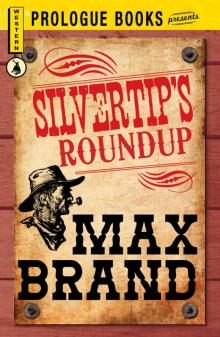 Silvertip's Roundup
Silvertip's Roundup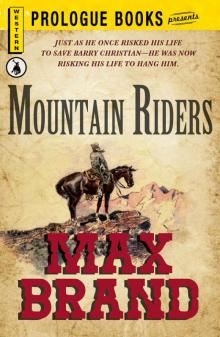 Mountain Riders
Mountain Riders Silvertip (1942)
Silvertip (1942)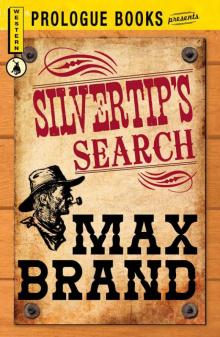 Silvertip's Search
Silvertip's Search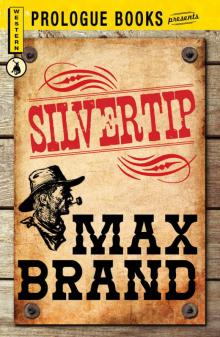 Silvertip
Silvertip Bull Hunter
Bull Hunter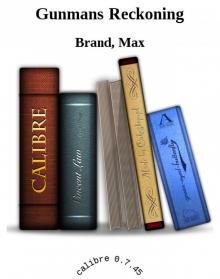 Gunmans Reckoning
Gunmans Reckoning The Seventh Man
The Seventh Man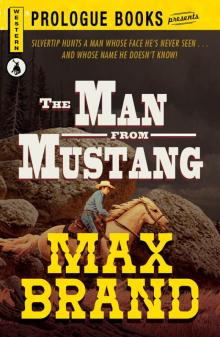 Man From Mustang
Man From Mustang Riders of the Silences
Riders of the Silences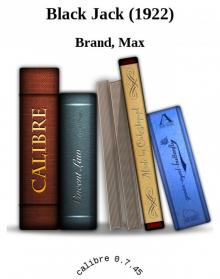 Black Jack (1922)
Black Jack (1922) Way of the Lawless
Way of the Lawless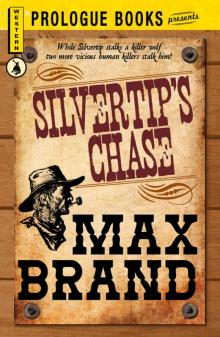 Silvertip's Chase
Silvertip's Chase Trailin
Trailin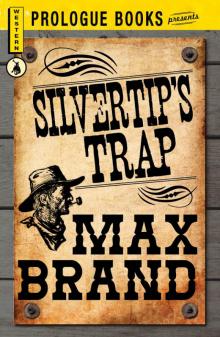 Silvertip's Trap
Silvertip's Trap Ronicky Doone (1921)
Ronicky Doone (1921) The Night Horseman
The Night Horseman the Garden Of Eden (1963)
the Garden Of Eden (1963)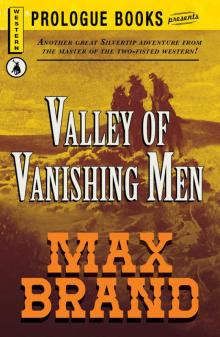 Valley of the Vanishing Men
Valley of the Vanishing Men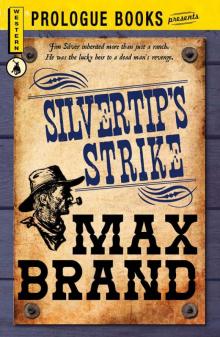 Silvertip's Strike
Silvertip's Strike Black Jack
Black Jack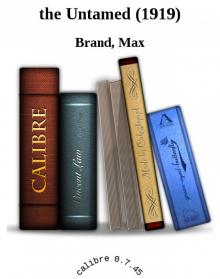 the Untamed (1919)
the Untamed (1919) Way Of the Lawless (1921)
Way Of the Lawless (1921) The Untamed
The Untamed